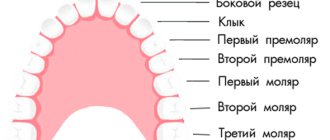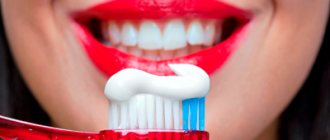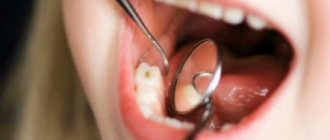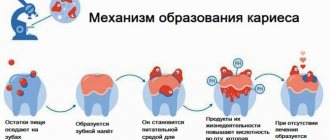Author of the article:
Soldatova Lyudmila Nikolaevna
Candidate of Medical Sciences, Professor of the Department of Clinical Dentistry of the St. Petersburg Medical and Social Institute, Chief Physician of the Alfa-Dent Dental Clinic, St. Petersburg
Placing a crown on a tooth is a very common procedure. However, we often hear complaints that after it the patient’s gums under the crown become inflamed. Let's try to answer the question, why does this happen?
Why does the gum under the crown hurt? Causes of pain.
The dentist will be able to determine exactly what case you have, and only he will be able to prescribe the most effective treatment.
Common problems:
- The crown is directly adjacent to the gums, so it is not surprising that irritation may occur between the gum and the foreign body. In addition, very often small particles of food get stuck in the space between the gum and the crown.
- Another reason for gum swelling and tissue inflammation may be that it is time to replace your crown - remember that they do not last forever and have a certain service life.
- Also, if the gums under the crown hurt, the tooth may be to blame. In any case, inflammation of the gums under the crown indicates a problem that only a dentist can fix.
- Crown injury. To ensure that the artificial structure is securely fixed and does not put pressure on the gingival margin, the orthopedist creates a small “step”. But sometimes this fails. In such cases, the crown begins to put pressure on the soft tissue, which disrupts the blood circulation process.
- In addition, if the edges of the crown overhang, they gradually rub the gums, causing microtrauma and compromising the integrity of the mucous membrane. Because of this, the soft tissues begin to become inflamed.
- Poor preparation for crown installation
- The most common cause of complications is poor preparation for surgery. It includes poor quality work and doctor errors. The most common ones include:
- Damage to the gums during grinding of dental tissues to install a crown. A diamond drill can touch soft tissues, leaving small damage on them, which in the future can become foci of inflammation.
- Poor quality of root canal filling.
- Perforation of the canal during fixation of the structure or during processing of the pin, which can also lead to gum inflammation.
- In rare cases, it happens that the gums under the crown are swollen due to a piece of instrument getting into the root canal. Of course, such situations, indicating the negligence of doctors, are rare, but this cause of inflammation of the gums near the crown should not be excluded.
Symptoms
At the initial stage, in the first 2-3 weeks after installation of the prosthetic system, discomfort is considered a natural side effect due to the patient’s body becoming accustomed to the foreign structure placed in the oral cavity. However, if unpleasant or painful sensations persist for several months, or are severe, it is recommended to undergo repeated clinical diagnostics. Among the negative symptoms indicating a pathological situation are:
- Formation of swelling and redness of the gums in the area of contact with the prosthesis;
- The occurrence of periodic bleeding and pain;
- Identification of areas where ulcerative lesions are localized;
- A persistent increase in body temperature, as well as bad breath.
The presence of inflammation is usually associated with problems with eating and articulation, and can also lead to disruption of sleep patterns and loss of appetite.
Signs of inflammation
You need to pay special attention to the following symptoms:
- Pain. Most often, its cause is inflammation of the soft tissue under the crown or irritation of the root canals.
- Edema. This is a signal that inflammation has begun.
- A fistula is a channel from which pus comes out; it may appear some time after swelling.
It is worth remembering that after prosthetics, the first two to three days may be uncomfortable. In this case, you do not need to take any additional measures; if pain interferes with the usual course of business, take pain medications.
Expert advice
Contacting little-known dental centers does not always lead to successful results. If dental prosthetics was performed by an inexperienced doctor, it is not at all surprising that inflammation occurred and additional gum treatment had to be sought. Don't try to save money on your health. We strongly recommend visiting only trusted dental clinics.
To reduce the likelihood of complications, follow simple rules:
- If you feel unwell or have a weakened immune system, it is not recommended to undergo prosthetics.
- Take good care of your teeth, including your artificial crown. Brush your teeth twice a day for 5 minutes, use additional hygiene products.
- Massage your gums to improve blood circulation and avoid possible consequences.
How to relieve pain
However, it is possible to relieve the painful symptoms of swollen gums under the crown using folk remedies:
- Mix a tablespoon of chopped thyme, chamomile and yarrow. Pour 200 ml of boiling water and let it brew for half an hour. Wait for the mixture to cool to room temperature and use as a rinse three times a day.
- The oak bark is simmered over low heat under a closed lid for 20-30 minutes. An infusion of sage leaves is added to the resulting decoction. A warm decoction will have a beneficial antiseptic and anti-inflammatory effect.
Of course, if the gum under the crown is inflamed, these methods can only relieve the pain momentarily, but they will not eliminate the cause of the disease, so you will still have to see a doctor.
How to prevent or relieve gum disease
After installation of dentures, both fixed and removable, discomfort may occur in the mouth. The reason is that the gums are not yet accustomed to the structures, and because of this, redness and swelling occur.
It is important to prevent the inflammatory process, and this can be done with the help of medications or folk remedies:
- Camomile tea. To prepare, take 1 tbsp. spoon of dried herb, pour boiling water and leave for 10-20 minutes. Rinse your mouth with the cooled infusion every 3 hours.
- Sage. Prepare the infusion in the same way or following the instructions on the package. It has an antimicrobial effect, therefore relieves inflammation and is safe for dentures.
- Oak bark decoction. Improves the condition of the gums in general, strengthening them and relieving inflammation.
- Salt + soda + water. A teaspoon of salt and soda per glass. This solution anesthetizes and disinfects.
- "Rotokan" is an inexpensive liquid herbal extract, sold in pharmacies. Dilute with water in the proportion specified in the instructions and rinse your mouth after each meal.
Medicinal herbs and antiseptic drugs prevent inflammation, relieve pain, stop bleeding, and avoid tissue infection as a result of rubbing with dentures. However, if there is bleeding and inflammation due to dentures, it is best to use proven products such as ASEPTA® Parodontal products.
What will the dentist do if the gums become inflamed after installing a crown?
First of all, the doctor will order an X-ray to determine the cause of inflammation of the gums under the crown. Treatment by the dentist will also be selected based on this information.
Most often in these cases it is necessary to remove the crown. Additionally, patients are prescribed anti-inflammatory treatment and antibiotics. It is possible to re-prosthetize a tooth after the gums have become inflamed only when the anti-inflammatory treatment has ended. And only then will a new crown be installed.
It is important to understand that folk remedies will not be effective in this case and will not replace seeing a doctor. If you realize that discomfort continues for more than three days, be sure to consult a doctor. Inflammation is a serious process that affects the body as a whole, so it is important to recognize the cause as early as possible and determine effective treatments for inflammation.
Treatment options
Depending on what triggered the pathological process, the doctor may recommend various methods of therapy:
In addition to the above solutions, for the treatment of gums, the doctor may prescribe various medications: anti-inflammatory, antibacterial, antihistamines, etc. The drugs can be intended for topical use or oral administration. |
To reduce discomfort before going to the dentist, you can use some tips:
- Rinse your mouth with a decoction or infusions based on medicinal plants: oak bark, chamomile, sage, etc.
- Take a painkiller, for example, Ketorol or Nise.
- Use ointments or gels for topical use with an analgesic effect.
Care
To avoid problems with structures, you should properly care for them. For teeth with crowns, you can use an irrigator and specialized solutions for it, for example, ASEPTA with extracts of medicinal herbs. This will ensure proper cleaning in hard-to-reach places and will be a good prevention of problems with crowns.
In addition, the specialized ASEPTA ACTIVE paste, made on the basis of natural herbs and special enzymes, will help you maintain a healthy state. It eliminates pathogenic bacteria, relieves gum inflammation and prevents bleeding, providing comprehensive protection to tooth enamel.
Daily use of ASEPTA mouth rinse will also help to avoid inflammation; it combines analgesic, anti-inflammatory and antimicrobial effects. It increases the effectiveness of periodontal treatment and prevents the development of many diseases.
Symptoms
The presence of discomfort during the first month from the moment of installation is a standard situation caused by the body’s gradual adaptation to the new element in the oral cavity. The reason for contacting a dentist is the persistence of painful sensations for 2-3 months after the operation. Symptoms that require medical evaluation include:
- Swelling and redness of gum tissue;
- Bleeding and pain;
- Formation of ulcerative and erosive areas;
- Temperature and unpleasant odor from the mouth.
The development of inflammation makes it difficult to eat and communicate with others, causing loss of appetite and disruption of sleep patterns.
Clinical researches
ASEPTA® mouth rinses are designed to protect gums from inflammation and improve oral hygiene. The main indications for their use are:
- acute and chronic gingivitis;
- acute and chronic periodontitis;
- stomatitis;
- post-extraction alveolitis;
- toothache of infectious origin.
Clinical trials conducted in laboratories have shown that after 3 weeks of using ASEPTA® rinse, gum bleeding is reduced by 28.3%, inflammation is reduced by 32.3% and the hygienic condition of the oral cavity is improved by 33.5%*.
Sources:
- Clinical and laboratory assessment of the influence of domestic therapeutic and prophylactic toothpaste based on plant extracts on the condition of the oral cavity in patients with simple marginal gingivitis. Doctor of Medical Sciences, Professor Elovikova T.M.1, Candidate of Chemical Sciences, Associate Professor Ermishina E.Yu. 2, Doctor of Technical Sciences Associate Professor Belokonova N.A. 2 Department of Therapeutic Dentistry USMU1, Department of General Chemistry USMU2
- Clinical experience in using the Asepta series of products Fuchs Elena Ivanovna Assistant of the Department of Therapeutic and Pediatric Dentistry State Budgetary Educational Institution of Higher Professional Education Ryazan State Medical University named after Academician I.P. Pavlova of the Ministry of Health and Social Development of the Russian Federation (GBOU VPO RyazSMU Ministry of Health and Social Development of Russia)
- Report on clinical trials to determine/confirm the preventive properties of commercially produced personal oral hygiene products: mouth rinse "ASEPTA PARODONTAL" - Solution for irrigator." Doctor of Medical Sciences Professor, Honored Doctor of the Russian Federation, Head. Department of Preventive Dentistry S.B. Ulitovsky, doctor-researcher A.A. Leontiev First St. Petersburg State Medical University named after academician I.P. Pavlova, Department of Preventive Dentistry.
What to do if the denture rubs
Only a qualified dentist can determine the factors that led to damage to the gum tissue and determine the appropriate treatment method. The best solution in such situations is to postpone the visit to the clinic.
If the cause of rubbing is the incorrect shape of the prosthetic structure, the doctor will make adjustments, gradually adjusting the system to the desired parameters. In case of extensive inflammation, a complete replacement of the system is allowed. It is worth noting that independent attempts to correct prostheses, as a rule, lead either to damage to the device or to aggravation of the situation with inflammation.
In order to relieve pain at home and alleviate the condition of the body, which has worsened due to the inflammatory process, the following methods can be used:
- Rinsing the mouth with a decoction with the addition of medicinal herbs;
- Applying anesthetic gels to the surface of the gums;
- Installation of overlays that limit contact between the prosthesis and gums;
- Massage that helps restore blood circulation;
- Taking analgesics to relieve pain.
However, if symptoms persist for a long time, the best solution would be to consult a dentist.
Prevention
Following preventive recommendations helps reduce the likelihood of developing inflammatory processes. These include:
- Careful adherence to the rules of hygienic oral care - regular brushing of teeth, rinsing and the use of special products to remove food debris;
- Following medical recommendations for handling the prosthesis - removing the removable structure at night and treating it with a disinfectant solution;
- Regular massage of gum tissue improves blood circulation and reduces pain.
In addition, after prosthetics, it is recommended to visit a doctor at least once every six months to conduct a routine examination and eliminate possible problems in the early stages of development.
Get a consultation
We will answer all your questions before visiting the clinic!
+7
Online registration
Content
1 Why does gum inflammation occur during dental prosthetics and how is it treated? 1.1 Dentist's mistake
1.2 Allergies
1.3 Incorrect load distribution
1.4 Poor hygiene
2 Inflammation of the gums during prosthetics: treatment
3 Anti-inflammatory therapy
4 Inflammation of the gums during prosthetics: photo
Types of materials used to make crowns
Modern prosthetics offers the manufacture of crowns from the following materials:
- Metal. Not exactly a modern type of prosthetics, but the cheapest and most accessible.
- Metal ceramics. Refers to budget options. Disadvantages - the inability to achieve the natural whiteness of an artificial tooth due to the presence of a metal base.
- Ceramics. Crowns are not as durable as metal-ceramic crowns, but they look more attractive and aesthetically pleasing. Usually installed on the front teeth.
- Porcelain. They look very natural, such teeth are very difficult to distinguish from natural ones. Ideal for installation on front teeth.
- Zirconium. The crown is based on a zirconium dioxide structure with a ceramic coating. Can be installed on any tooth, regardless of its condition. The main disadvantage is the high cost.
Tooth pain under a crown does not arise due to any specific material used in its manufacture, as many people think. If discomfort and pain occur, we can talk about inflammation of the mucous membrane and gums caused by an allergic reaction to the metal of the crown. Ceramics and zirconium are hypoallergenic and do not cause problems such as allergies.











